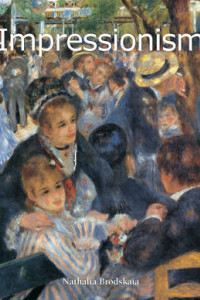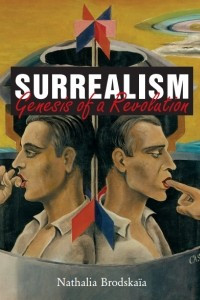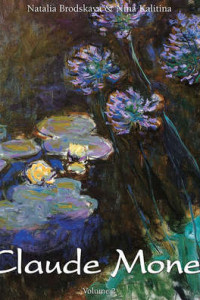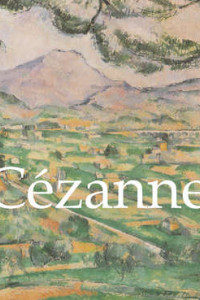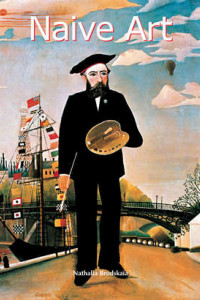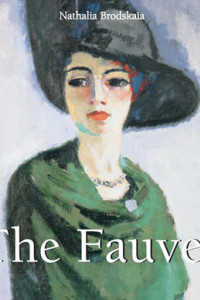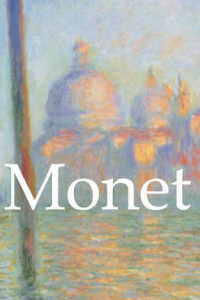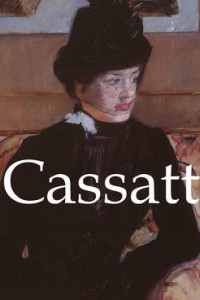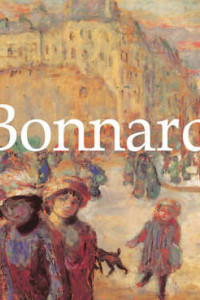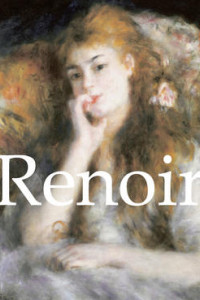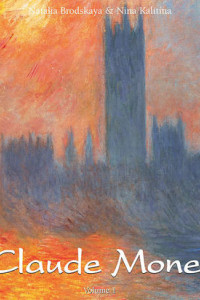- Главная
- Авторы
- Nathalia Brodskaya
- Книги Nathalia Brodskaya
Книги Nathalia Brodskaya
Nathalia Brodskaya - автор 22 книг. Из известных произведений можно выделить: Impressionism, Renoir, Camille Pissarro. Все книги можно читать онлайн и бесплатно скачивать на нашем портале.
“I paint what I see and not what it pleases others to see.” What other words than these of Édouard Manet, seemingly so different from the sentiments of Monet or Renoir, could best define the Impressionist movement? Without a doubt, this singularity was explained when, shortly before his death, Claude Monet wrote: “I remain sorry to have been the cause of the name given to a group the majority of w...
Surrealists appeared in the aftermath of World War I with a bang: revolution of thought, creativity, and the wish to break away from the past and all that was left in ruins.This refusal to integrate into the bourgeois society was also a leitmotiv of Dada artists, and André Breton asserted that Dada does not produce perspective. Surrealism emerged amidst such feeling. Surrealists and Dada artists o...
A painter of the Impressionist movement, Alfred Sisley was born on October 30th 1839 in Paris but was of British origin. He died on January 29th 1899 in Moret-sur-Loing. Growing up in a musical family, he chose to pursue painting rather than the field of business. In 1862 he enrolled in Gleyre’s studio where he encountered Renoir, Monet, and Bazille. The four friends left their master’s studio in ...
With Impression, Sunrise, exhibited in 1874, Claude Monet (1840–1926) took part in the creation of the Impressionist movement that introduced the 19 century to modern art. All his life, he captured natural movements around him and translated them into visual sensations. A complex man and an exceptional artist, Monet is internationally famous for his poetic paintings of waterlilies and beautiful la...
Lautrec studied with two of the most admired academic painters of the day, Léon Bonnat and Fernand Cormon. Lautrec’s time in the studios of Bonnat and Cormon had the advantage of introducing him to the nude as a subject. At that time life-drawing of the nude was the basis of all academic art training in nineteenth-century Paris. While still a student, Lautrec began to explore Parisian nightlife, w...
Degas was closest to Renoir in the impressionist’s circle, for both favoured the animated Parisian life of their day as a motif in their paintings. Degas did not attend Gleyre’s studio; most likely he first met the future impressionists at the Café Guerbois. He started his apprenticeship in 1853 at the studio of Louis-Ernest Barrias and, beginning in 1854, studied under Louis Lamothe, who revered ...
Since his death 200 years ago, Cézanne has become the most famous painter of the nineteenth century. He was born in Aix-en-Provence in 1839 and the happiest period of his life was his early youth in Provence, in company with Emile Zolá, another Italian. Following Zolá’s example, Cézanne went to Paris in his twenty-first year.During the Franco-Prussian war he deserted the military, dividing his tim...
Naive art first became popular at the end of the 19th century. Until that time, this form of expression, created by untrained artists and characterised by spontaneity and simplicity, enjoyed little recognition from professional artists and art critics. Influenced by primitive arts, naive painting is distinguished by the fluidity of its lines, vivacity, and joyful colours, as well as by its rather ...
Paul Gauguin was first a sailor, then a successful stockbroker in Paris. In 1874 he began to paint at weekends as a Sunday painter. Nine years later, after a stock-market crash, he felt confident of his ability to earn a living for his family by painting and he resigned his position and took up the painter’s brush full time. Following the lead of Cézanne, Gauguin painted still-lifes from the very ...
Born at the dawn of the 20th century, Fauvism burst onto the artistic scene at the 1905 Salon d'Automne with great controversy by throwing bright, vibrant colours in the face of artistic convention. Fuelled by change, artists like Matisse, Derain, and Vlaminck searched for a new chromatic language by using colour out of its habitual context. Freed from the strict technique advocated by the École d...
For Claude Monet the designation ‘impressionist’ always remained a source of pride. In spite of all the things critics have written about his work, Monet continued to be a true impressionist to the end of his very long life. He was so by deep conviction, and for his Impressionism he may have sacrificed many other opportunities that his enormous talent held out to him. Monet did not paint classical...
Symbolism appeared in France and Europe between the 1880s and the beginning of the 20th century. The Symbolists, fascinated with ancient mythology, attempted to escape the reign of rational thought imposed by science. They wished to transcend the world of the visible and the rational in order to attain the world of pure thought, constantly flirting with the limits of the unconscious.The French Gus...
Félix Vallotton, né à Lausanne le 28 décembre 1865 et mort à Paris le 29 décembre 1925, est un artiste peintre, sculpteur et graveur sur bois Suisse, naturalisé Français en 1900.En une dizaine d’années, Vallotton parvient à se faire un nom auprès de l\'avant-garde parisienne. Sa renommée devient internationale grâce à ses gravures sur bois et à ses illustrations en noir et blanc qui font sensation...
Mary was born in Pittsburgh. Her father was a banker of liberal educational ideas and the entire family appears to have been sympathetic to French culture. Mary was no more than five or six years old when she first saw Paris, and she was still in her teens when she decided to become a painter. She went to Italy, on to Antwerp, then to Rome, andfinally returned to Paris where in 1874, she permanent...
Le Douanier Rousseau (Henri Rousseau)(Laval, 1844 – Paris, 1910)Les galeries marchandes à Paris fleurissant, on créa en 1884, le Salon des Indépendants. Cette exposition sans jury fut organisée pour ceux qui étaient ou se considéraient professionnels – alors très nombreux -, mais qui ne pouvaient satisfaire les critères des salons officiels. C’est lors d’un des Salons des Indépendants qu’ Henri Ro...
Pierre Bonnard was the leader of a group of Post-Impressionist painters who called themselves the Nabis, from the Hebrew word meaning “prophet”. Bonnard, Vuillard, Roussel and Denis, the most distinguished of the Nabis, revolutionised decorative painting during one of the richest periods in the history of French painting. Bonnard’s works are striking for their strong colours and candidness.
Pierre–Auguste Renoir (Limoges, 1841 – Cagnes-Sur-Mer, 1919)Pierre-Auguste Renoir naquit le 25 février 1841 à Limoges. En 1854, ses parents retirèrent l'enfant de l'école et le placèrent dans l'atelier des frères Lévy afin qu'il apprenne la peinture sur porcelaine. Son frère cadet, Edmond Renoir,racontait : «De ce qu'il usait des bouts de charbon sur les murs, on en conclut qu'il aurait du goût po...
« Le père Pissarro », comme aimaient à l’appeler ses amis, était le plus sage des artistes impressionnistes. Peut être son âge, plus avancé que celui de ses camarades Monet, Sisley, Bazille et Renoir, ou plutot sa maturité, lui firent créer des œuvres sereines et sobres tant dans leur sujet que dans leur composition.Homme au goûts simples, il se plut à peindre des paysans sur les chemins, bien qu’...
Degas was closest to Renoir in the impressionist’s circle, for both favoured the animated Parisian life of their day as a motif in their paintings. Degas did not attend Gleyre’s studio; most likely he first met the future impressionists at the Café Guerbois. He started his apprenticeship in 1853 at the studio of Louis-Ernest Barrias and, beginning in 1854, studied under Louis Lamothe, who revered ...
Bei seinen Zeitgenossen vor allem als Mäzen und Sammler bekannt, nimmt Caillebotte heute seinen rechtmäßigen Platz im Pantheon der Künstler ein – als Maler, der in seinen bahnbrechenden Werken in einzigartiger Weise den Realismus mit dem Impressionismus verbindet. Bemerkenswert ist die Verbindung von fotografischen Techniken, von der Perspektive und der akkuraten Abbildung der Realität mit der poe...
“Father Pissarro”, as his friends liked to call him, was the most restrained of the artists of the Impressionist movement. Perhaps it was his age, being older than his fellow artists Monet, Sisley, Bazille, and Renoir, or rather his maturity, which resulted in his works having such serene and sober subjects and compositions.A man of simple tastes, he enjoyed painting peasants going about their dai...
With Impression, Sunrise, exhibited in 1874, Claude Monet (1840–1926) took part in the creation of the Impressionist movement that introduced the 19 century to modern art. All his life, he captured natural movements around him and translated them into visual sensations. A complex man and an exceptional artist, Monet is internationally famous for his poetic paintings of waterlilies and beautiful la...

